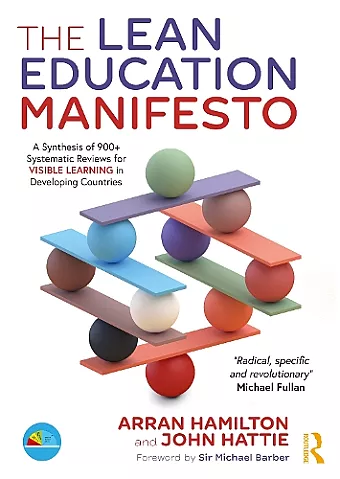The Lean Education Manifesto
A Synthesis of 900+ Systematic Reviews for Visible Learning in Developing Countries
John Hattie author Arran Hamilton author
Format:Paperback
Publisher:Taylor & Francis Ltd
Published:31st Mar '22
£21.99
Available to order, but very limited on stock - if we have issues obtaining a copy, we will let you know.
This paperback is available in another edition too:
- Hardback£135.00(9780367762971)

The global expansion of education is one of the greatest successes of the modern era. More children have access to schooling and leave with higher levels of learning than at any time in history. However, 250 million+ children in developing countries are still not in school, and 600 million+ attend but get little out of it – a situation further exacerbated by the dislocations from COVID-19.
In a context where education funding is stagnating and even declining, Arran Hamilton and John Hattie suggest that we need to start thinking Lean and explicitly look for ways of unlocking more from less. Drawing on data from 900+ systematic reviews of 53,000+ research studies – from the perspective of efficiency of impact – they controversially suggest that for low- and middle-income countries:
- Maybe pre-service initial teacher training programs could be significantly shortened and perhaps even stopped
- Maybe teachers need not have degree-level qualifications in the subjects they teach, and they might not really need degrees at all!
- Maybe the hours per week and years of schooling that each child receives could be significantly reduced, or at least not increased
- Maybe learners can be taught more effectively and less resource intensively in mixed-age classrooms, with peers tutoring one another
- Maybe different approaches to curriculum, instruction, and the length of the school day might be more cost-effective ways of driving up student achievement than hiring extra teachers, reducing class sizes, or building more classrooms
- Maybe school-based management, public–private partnerships, and performance-related pay are blind and expensive alleys that have limited influence or impact on what teachers actually do in classrooms.
This groundbreaking and thought-provoking work also identifies a range of initiatives that are worth starting. It introduces the Leaning to G.O.L.D. methodology to support school and system leaders in selecting, implementing, and scaling those high-probability initiatives; and to rigorously de-implement those to be stopped. It is essential reading for anyone with an interest in education.
"The Lean Education Manifesto is a radical, specific and revolutionary set of new ideas for transforming education in developing countries. This book is all the more powerful because it comes from experienced researchers who deeply know the existing situation, are willing to question all our basic assumptions, and turn just about everything we know on its head. On top of this their new ideas are specific and comprehensive. The pandemic has discombobulated what was already an ineffective and inefficient education system. I love the boldness and quality of the ideas. Here is a book worth examining closely in the search for brand new solutions."
Emeritus Professor Michael Fullan, OISE/University of Toronto, Canada
"This book by Hamilton and Hattie, expectedly, is a tour de force. The book has multiple aspects that each would have made a substantial stand-alone work. There is of course the over-the-top development of the most extensive database on school outcomes available anywhere. There is the delineation of things that are commonly done that don’t match the evidence. There is the clear set of new ideas highlighted by a focus on making economic decisions about the operation of schools. There is practical application of evidence to policy and operations of schools. But to me the key is a willingness to rethink schools, to imagine policies based more on science than on history. Imagine the transformation of the world's schools if this approach catches on."
Professor Eric Hanushek, Paul and Jean Hanna Senior Fellow at the Hoover Institution of Stanford University, US
"The Lean Education Manifesto comes at a time when many children are not learning despite attending school and the pandemic further exacerbating learning losses and amplifying inequities. It provides prudent advice: we have to rethink education, in some cases radically. Simply throwing money towards "bad buys" is reckless. Hamilton and Hattie offer alternative thinking by drawing on their extensive research to make education work for those that need the most help. The biggest takeaway is that this echoes the thinking that we need to go back to basics with evidence, openness and systemic approach to find alternatives for impact."
Dr Brajesh Panth, Chief of Education Sector Group, Asian Development Bank
"The Lean Education Manifesto is about learning. Particularly, what works in developing countries that have made great strides in terms of getting children enrolled in school but face formidable challenges in terms of student learning. Synthesizing almost 1000 systematic reviews gives us some answers, but also makes the case that we need more data. It is imperative that we invest in data systems and innovate in school systems. Still, Hamilton and Hattie show us what can be done with current knowledge and resources. This is a must read for policymakers, researchers, and funders of school systems in developing countries."
Dr Harry Patrinos, Education Practice Manager, World Bank
"What Arran Hamilton and John Hattie have done in this major contribution to the literature is to provide at a level of detail evidence of what works best in classrooms, schools, and systems. Their book provides school and system improvers with a kind of one-stop-shop, a heat map… [and] could not be more timely. My advice is read what they say, look at the evidence they cite and reflect on the implications and the opportunities for your context."
Sir Michael Barber, Author of ‘Accomplishment: How Ambitious and Challenging Things Get Done’ and ‘How to Run a Government’
ISBN: 9780367762988
Dimensions: unknown
Weight: 640g
308 pages